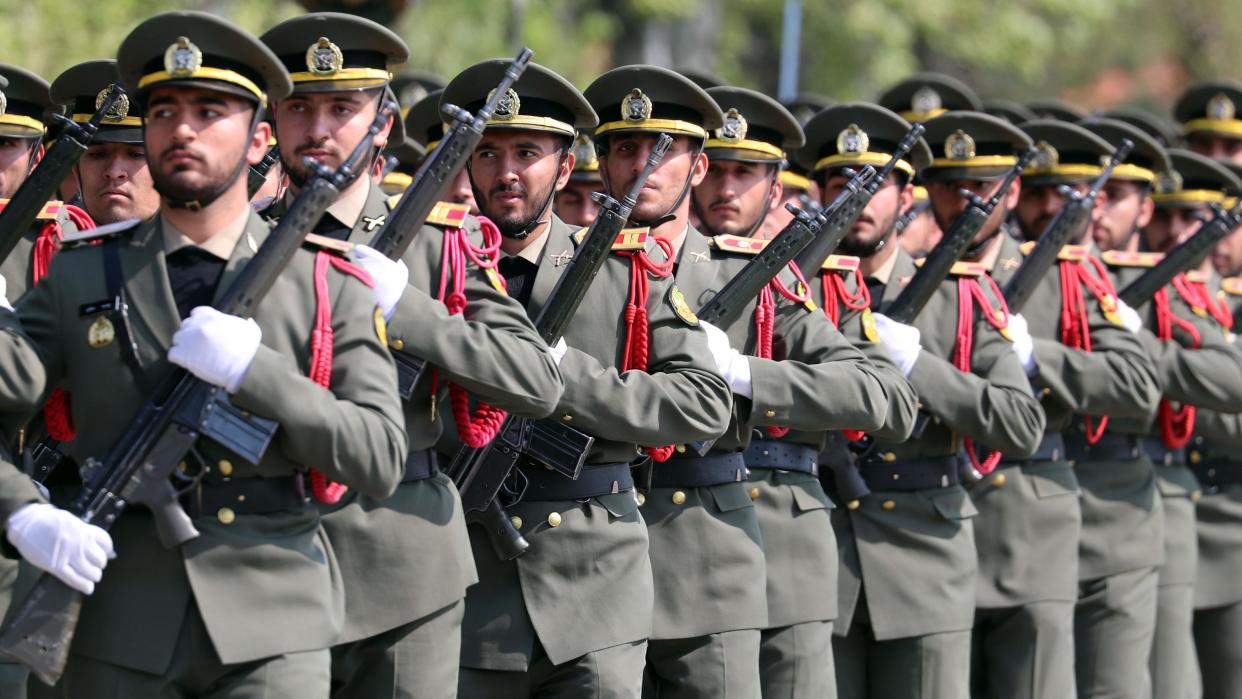Canada lists Iran's Revolutionary Guards as a terrorist group

- Oops!Something went wrong.Please try again later.
Canada has listed Iran’s Islamic Revolutionary Guard Corps (IRGC) as a terrorist organisation, after years of pressure from opposition legislators and some members of the Iranian diaspora.
Announcing the decision on Wednesday, Public Safety Minister Dominic LeBlanc called it a “significant tool in fighting global terrorism”.
The move will mean that thousands of senior Iranian government officials, including top IRGC officials, will be barred from entering Canada.
Iran's foreign ministry spokesman, quoted by Iran's Fars news agency, has condemned what he described as the "unwise and unconventional" step.
The IRGC is a major military, political and economic force in Iran, with close ties to the Supreme Leader, Ayatollah Ali Khamenei.
It is estimated to have more than 190,000 active personnel with its own ground forces, navy and air force that oversee Iran’s strategic weapons.
The IRGC exerts influence elsewhere in the Middle East by providing money, weapons, technology, training and advice to allied governments and armed groups through its shadowy overseas operations arm, the Quds (Jerusalem) Force, according to the government.
The Quds Force was already listed as a terrorist group by Canada, but Wednesday’s announcement extends the designation to the entire IRGC.
Speaking to reporters, Mr LeBlanc said the action “sends a strong message that Canada will use all of the tools at its disposal to combat the terrorist entity of the IRGC".
“The Iranian regime has consistently displayed disregard for human rights, both inside and outside of Iran as well as a willingness to destabilise the international rules-based order,” he said.
After this designation, current and former senior Iranian government officials already in Canada may also now be investigated and removed.
Canada's foreign affairs minister, Melanie Joly, warned that Canadians in Iran could be at risk of arbitrary detention following the announcement.
“My message is clear: for those who are in Iran right now, it’s time to come back home,” she said.
“And for those who are planning to go to Iran, don’t go.”
In response, Iran's foreign ministry spokesperson Nasser Kanaani was quoted as describing Canada's move as "an unwise and unconventional politically-motivated step".
"Canada's action will not have any effect on the Revolutionary Guards' legitimate and deterrent power," he said.
The Canadian government under the leadership of Prime Minister Justin Trudeau had previously declined to extend the terrorism designation to the IRGC, despite pressure from some diaspora members - including the families of those who died after Flight PS752 was shot down by the IRGC in January 2020 in Tehran.
All 175 passengers onboard the plane were killed, including 55 Canadian citizens and 30 permanent residents of Canada.
Tehran had claimed that the missile strike on the plane was done by mistake.
Mr Trudeau had previously said in 2022 that he feared a terrorism designation would unfairly target Iranians in Canada who opposed the regime and fled, but had to serve in the IRGC in the past.
Asked why now by reporters, Mr LeBlanc said the decision to designate a group as a terrorist entity is a “deliberative process” made on advice of security services and with foreign policy considerations.
“It is a threshold that must be met under the criminal code of Canada,” he said.
The move makes Canada the second country in North America after the US to label the IRGC as a terrorist organisation, which did so in 2019.
The UK had previously indicated its intent to make a similar move as recently as 2023, but has yet to do so.

